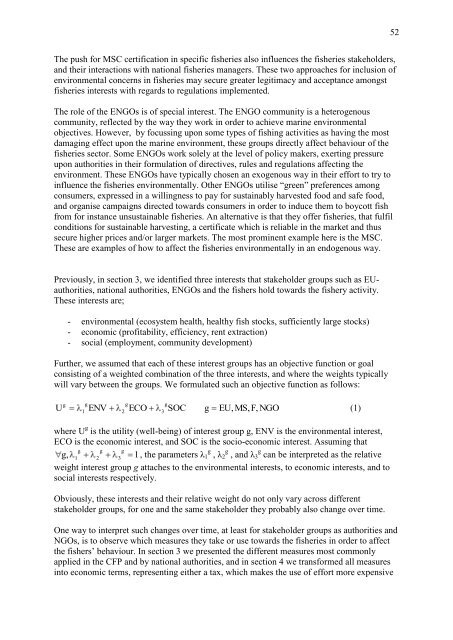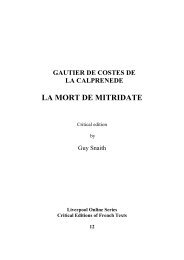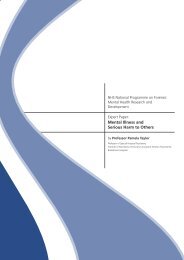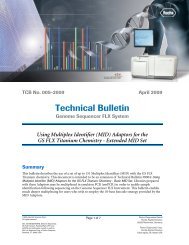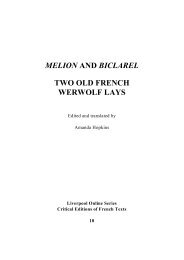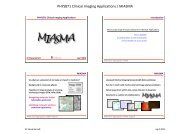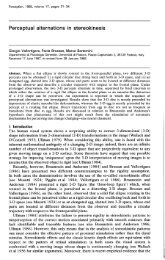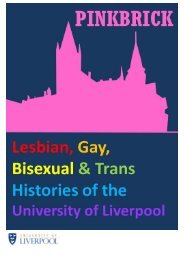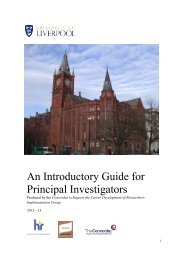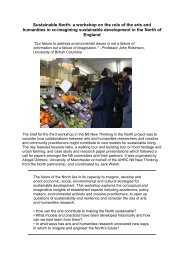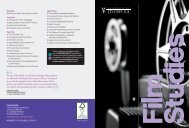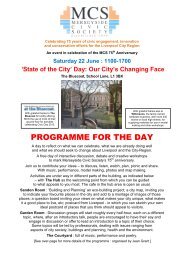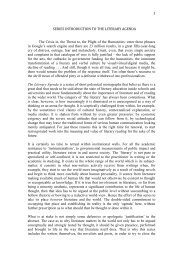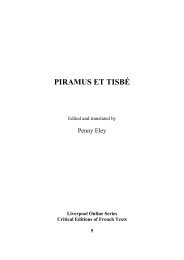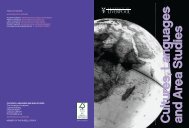Operational tools and adaptive management
Operational tools and adaptive management
Operational tools and adaptive management
You also want an ePaper? Increase the reach of your titles
YUMPU automatically turns print PDFs into web optimized ePapers that Google loves.
The push for MSC certification in specific fisheries also influences the fisheries stakeholders,<br />
<strong>and</strong> their interactions with national fisheries managers. These two approaches for inclusion of<br />
environmental concerns in fisheries may secure greater legitimacy <strong>and</strong> acceptance amongst<br />
fisheries interests with regards to regulations implemented.<br />
The role of the ENGOs is of special interest. The ENGO community is a heterogenous<br />
community, reflected by the way they work in order to achieve marine environmental<br />
objectives. However, by focussing upon some types of fishing activities as having the most<br />
damaging effect upon the marine environment, these groups directly affect behaviour of the<br />
fisheries sector. Some ENGOs work solely at the level of policy makers, exerting pressure<br />
upon authorities in their formulation of directives, rules <strong>and</strong> regulations affecting the<br />
environment. These ENGOs have typically chosen an exogenous way in their effort to try to<br />
influence the fisheries environmentally. Other ENGOs utilise “green” preferences among<br />
consumers, expressed in a willingness to pay for sustainably harvested food <strong>and</strong> safe food,<br />
<strong>and</strong> organise campaigns directed towards consumers in order to induce them to boycott fish<br />
from for instance unsustainable fisheries. An alternative is that they offer fisheries, that fulfil<br />
conditions for sustainable harvesting, a certificate which is reliable in the market <strong>and</strong> thus<br />
secure higher prices <strong>and</strong>/or larger markets. The most prominent example here is the MSC.<br />
These are examples of how to affect the fisheries environmentally in an endogenous way.<br />
Previously, in section 3, we identified three interests that stakeholder groups such as EUauthorities,<br />
national authorities, ENGOs <strong>and</strong> the fishers hold towards the fishery activity.<br />
These interests are;<br />
- environmental (ecosystem health, healthy fish stocks, sufficiently large stocks)<br />
- economic (profitability, efficiency, rent extraction)<br />
- social (employment, community development)<br />
Further, we assumed that each of these interest groups has an objective function or goal<br />
consisting of a weighted combination of the three interests, <strong>and</strong> where the weights typically<br />
will vary between the groups. We formulated such an objective function as follows:<br />
U<br />
g<br />
g<br />
1<br />
ENV<br />
g<br />
2<br />
ECO<br />
g<br />
3<br />
SOC<br />
g<br />
EU,<br />
MS,<br />
F,<br />
NGO<br />
where U g is the utility (well-being) of interest group g, ENV is the environmental interest,<br />
ECO is the economic interest, <strong>and</strong> SOC is the socio-economic interest. Assuming that<br />
g g g<br />
g,<br />
1 2 3 1,<br />
the parameters λ1 g , λ2 g , <strong>and</strong> λ3 g can be interpreted as the relative<br />
weight interest group g attaches to the environmental interests, to economic interests, <strong>and</strong> to<br />
social interests respectively.<br />
Obviously, these interests <strong>and</strong> their relative weight do not only vary across different<br />
stakeholder groups, for one <strong>and</strong> the same stakeholder they probably also change over time.<br />
One way to interpret such changes over time, at least for stakeholder groups as authorities <strong>and</strong><br />
NGOs, is to observe which measures they take or use towards the fisheries in order to affect<br />
the fishers‟ behaviour. In section 3 we presented the different measures most commonly<br />
applied in the CFP <strong>and</strong> by national authorities, <strong>and</strong> in section 4 we transformed all measures<br />
into economic terms, representing either a tax, which makes the use of effort more expensive<br />
(1)<br />
52


